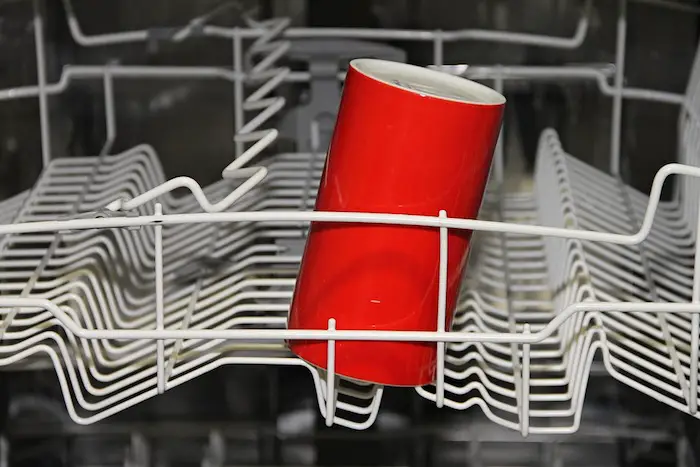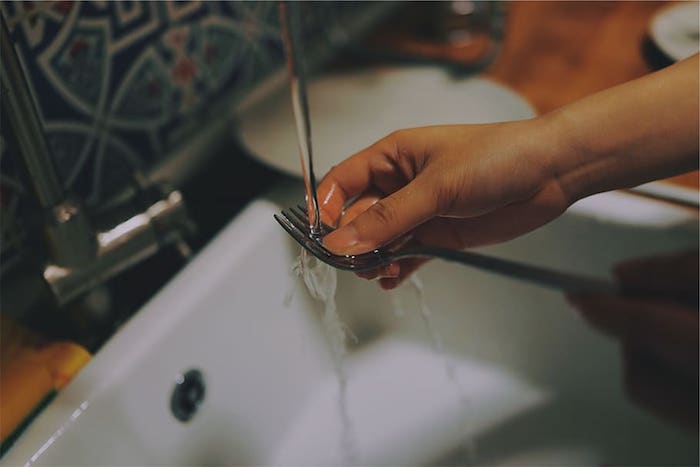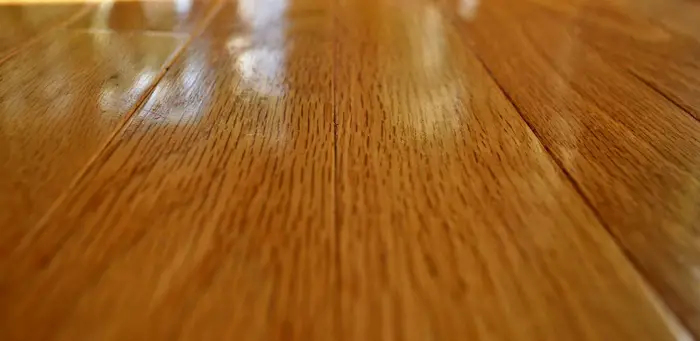Hot water on our hands may feel uncomfortable but it is a ticket to clean dishes. People may argue that cleaning dishes with plenty of soap works just as fine as using hot water but that is not true. Even though soap cleans and disinfects the dishes, hot water has its role to play.
Can you wash dishes in cold water? Yes, you can, but hot water is more effective than cold water and dish soap. Therefore, if you are looking to maintain high hygienic conditions and cleanliness, it is recommendable to use hot water.
There are several reasons why you should use hot water to hand wash your dishes. Top of them all is that hot water cuts grease on your dishes, something that cold soapy water does not do unless you apply some force. This article will look deeper into other reasons why hot water is the best for hand washing dishes as compared to cold water.
Keep reading to learn more about reasons to use hot water for washing dishes, when you should use cold water to wash dishes, if dishwashers require hot or cold water, other tips on washing dishes and other related questions.
Reasons for Using Hot Water to Wash Dishes
The following are reasons why hot water and not cold, works best for cleaning dishes.
- It Gets Rid of Grease Completely
As mentioned above, if you are looking to get rid of grease from your dishes use hot water and dish soap. While else it is true that dish soap works on the grease, the hot water loosens the grease molecules so that the detergent can grab it and not let go. As such, when you clean the dishes, foam from the soap leaves with the grease.
You might be wondering, why the dish soap won’t grab the grease molecules without them being loosened. Well, the dish soap can only grab what it can touch and the surface of grease is so tight making it hard for the dish soap to grab a single molecule. That is why you use water to soften the grease and loosen the molecules making it available for the dish soap to grab.
This might also explain why when using cold water to wash greasy dishes, you have to scrub them. Scrubbing ensures that the dish soap is exposed to the detergent.
- Kill Bacteria
Unlike cold water, hot water is useful in killing bacteria and sterilizing your dishes. So then, unless you are willing to expose your family and yourself to possible bacteria and food poisoning, there is no need to use cold water for cleaning dishes.
- It has Higher Cleaning Power
The importance of hot water does not stop at greasy dishes. Even for the non –greasy dishes, hot water has a superior cleaning power as compared to cold water.
For starters, hot water will speed up the dissolving process of food and grime from the dishes. This means that you will spend less time cleaning your dishes with hot water as compared to using cold water.
- It Reduces Drying Time
Dishes rinsed in hot water dry faster as compared to those rinsed in cold water. In fact, dishes rinsed in hot water tend to dry themselves.
Other than the speed of drying, dishes cleaned by hot water, dry spot and streak-free. As a result, you end up with sparkling clean dishware.
- Reduced Effort
Since hot water has superior cleaning powers, it only means that you will use less effort cleaning your dishes as compared to what you would have used withcold water.
When to Use Cold Water for Cleaning Dishes
As mentioned above we have not completely written off using cold water for cleaning dishes. In fact, some food remains are cleaned best using cold water. These remains include dishes used for dairy products like ice cream, yogurt, and milk.
When you use hot water for these remains, the remains tend to become gummy on the dishes making your work twice as hard.
Should you find yourself with cold water and soap only, there is no reason to panic. Also, sometimes if the dishes are not to oily, you do not have to use hot water.
Bottom line, it is possible to get your dishes clean with cold water and dish soap but you will have to scrub for longer and use more effort to get your dishes clean.
Do Dish Washers Require Hot or Cold Water?

Ideally, dishwashers are connected to a hot water line. As such, they wash dishes using the hottest water possible. That also explains why dishwashers are considered effective in cleaning dishes. Therefore, these machines do not require hot or cold-water since they already use hot water.
Moreover, dishwashers disinfect and sanitize dishes, something that is left to hot water when hand washing dishes.
Sometimes the water in the dishwater may cool down. As such, before using your dishwasher, run the water into the sink until the water turns hot for the best cleaning results.
Tips for Cleaning Dishes
Cleaning Dishes is not exactly a favorite house chore for many. To start, it is monotonous because, hello, you cannot dispose of your dishes every time you feed. It is also a very tedious process. Even those with dishwashers are not spared since not all dishes can go into the machine.
With all the above reasons and more, the one thing we all want is a way or ways to make the process of washing dishes easier and equally effective. So apart from using hot water, the following are other tips for washing dishes.
- Wipe Food Remains off the Dishes.
Look, this is one of the easiest life jacks for cleaning dishes. As soon as you are done with your meal, empty the food remains in a trash can and wipe off the residues as soon as possible.
It is very hard to clean dishes with food that has settled on it for some time. This is because, when food is left on the dishes, moisture evaporates from the food making it more solid. The solid food then adheres to the dish making it hard to be cleaned.
- Do not Pile up Dishes
Even as you wipe off food remains from your dishes, do not pile up dirty dishes. I insist became sometimes wiped dishes can give you a false idea that your kitchen is clean.
The thing about piling dishes is that the larger the pile grows the lower your interest to wash them gets. Therefore, you had rather clean dishes as soon as they get dirty to avoid chaos in your kitchen. Besides, we all want a clean kitchen, don’t we?
- Invest in Dish Washing Tools

If you want your dishes clean, invest in a good sponge and other washing tools. A good sponge should not scratch your dishes and bacteria should not easily cling on it. You can find a good sponge at a local big box store.
Another dishwashing tool that you should invest in is yellow gloves. These yellow gloves are very important in protecting your hands.
For starters, since you will be using hot water, the gloves will help protect your hands. The gloves also help your hands retain their natural oils, which can easily be absorbed by the dishwashing soap and other detergents used.
Still on protection, wearing the gloves reduces the chances of your hands getting cuts and bruises from random sharp dishware such as knives.
Other than protecting your hands, the yellow gloves will help you have a firmer grip on the dishes when they are soapy. This reduces the chance of accidents happening when dishes slip from your hand.
- Purchase a Dish Rack
Buy a good dish rack where you can place your dishes to give them space and time to dry. A good dish rack also ensures that your kitchen surface is not cluttered.
- Soak the Dishes
If you are trying to get rid of tough stains, consider soaking your dishes in a solution of water and dish liquid for sometime. Soaking your dishes helps to loosen the food remains. As such, for the best results leave the dishes overnight and clean them in the morning.
- Allow the Dishes to Dry
Most people, tend to hand dry their dishes when they are still wet. Even though it looks like saving time, it has dire consequences. The dishtowels are a breeding ground for bacteria. As such, when you use it to wipe off your clean dishes, you can easily transfer these bacteria to your dishes. Bacteria, in turn, could lead to health complications.
That also means all the work you have put into cleaning your dishes has gone to waste.
Wash Your Dishes in The right Order
There is no manual to living life but there is a manual to washing your dishes, yes there is an order to follow. It is recommended that you start from the least greasy dishes to the greasiest dishes.
So then, start with the glassware and drinking vessels. Move to the cutlery then to the plates, bowels and final the pots and pans which are the most greasy.
If in the process the water gets too grisly, change it to make your work easy.
- Use Baking Soda
You can use baking soda to hand wash your dishes. For a product that is easily available at home, it comes in handy for enhancing abrasiveness. It also helps to get rid of grease and debris on the dishes
To use it, add a tablespoon of baking soda to your dishwashing water and add some detergents or dish soap. You can also use baking soda to soak and clean your sponge and make sure that it remains clean even after use.
- Sanitize Your Dishes
When you are done washing your dishes, make an effort to sensitize them using a sanitizing solution like ammonia. Therefore, add a tablespoon of sanitizing liquid to the water used for rinsing and dip your dishes in the solution.
This process mimics the sterilization process in a dishwasher. Also, you can use this solution to clean your sponge once you are done.
Related Questions
Does cold water and regular soap kill germs found in dishes?
Yes, cold water kills germs found on your dishes. Note that while hot water can kill bacteria, cold water can kill the germs. This also means that using cold water is not entirely dismissed it is just a harder way to clean your dishes.
Are there specific detergents used for cold or warm water?
Yes, some detergents refuse to activate if a certain temperature is not achieved. Most of these detergents activate at a warmer temperature. Therefore, be careful with the detergent you purchase for your dishes.
What do I do to stop the foul smell from my Yellow gloves?
A bad smell coming from your yellow gloves is one of the troubles of using the gloves. However, do not worry we have solutions lined up for you. For starters, you can sprinkle some baking soda inside the gloves before wearing them next time. Baking soda deodorizes the gloves, therefore, removing the bad smell. Other than deodorizing, baking soda helps the gloves slip on and off your hands with ease.
An alternative to the rubber glove is using latex-free gloves. These gloves are usually easier to put on and less smelly. It can also be an alternative for people who are allergic to latex products.
Related Article:
Can You Wash Dishes With Wedding Ring?
Can I Use Dishwasher Detergent To Hand Wash Dishes
5 Best Dishwashers For Indian Cooking In USA
Can You Use Dishwasher Pods For Laundry


